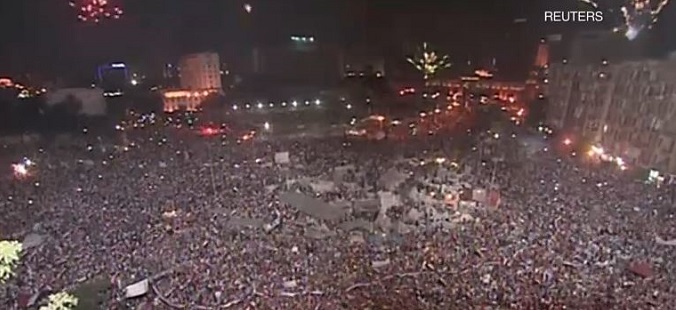Egyptians ranging from young protesters physically in Tahrir Square to elements of Egypt’s upper society have seen assertions that the army’s moves against former president Mohamed Morsi – taken after what were likely the largest national protests in human history – constituted a coup. Reuters reports on broad disagreement with that characterization:
“A coup? No!” said Ahmed Eid, 19, a business studies student at Cairo University, as he and his friends snapped souvenir pictures of each other, draped in the national flag, on Tahrir Square. “This was our new revolution!” “Our president was very bad. The army are our brothers.”…
Not a “coup” but a “popular impeachment” was one original expression, put forward by Amr Moussa… “Some Western media insist what happened in Egypt was a coup d’etat. In fact, this was unfair,” Moussa, who headed the Arab League until two years ago, told Reuters… “This was a popular uprising, a popular revolution,” he added. “In fact it was a popular impeachment of the president.”
The White House has also been pointedly careful to avoid accusing the army of having conducted a coup. There are multiple issues at stake, from U.S.-Egyptian military ties to Egyptian perceptions of the administration.
U.S. security assistance to Egypt is subject to legislation that bans aid to countries in the aftermath of coups. An aid cut off would endanger military relationship which many analysts consider critical to promoting U.S. influence in the region.
Meanwhile the administration is already battling preceptions that it has sided too closely with the Muslim Brotherhood. A double-bylined article published last week by the Daily Beast argued that “the Obama administration has done little to press Morsi’s administration to support human rights.” The evaluation has been echoed by protest leaders, who have expressed public anger at Obama and U.S. Ambassador to Egypt Anne Patterson.
[Photo: cnn.com]




